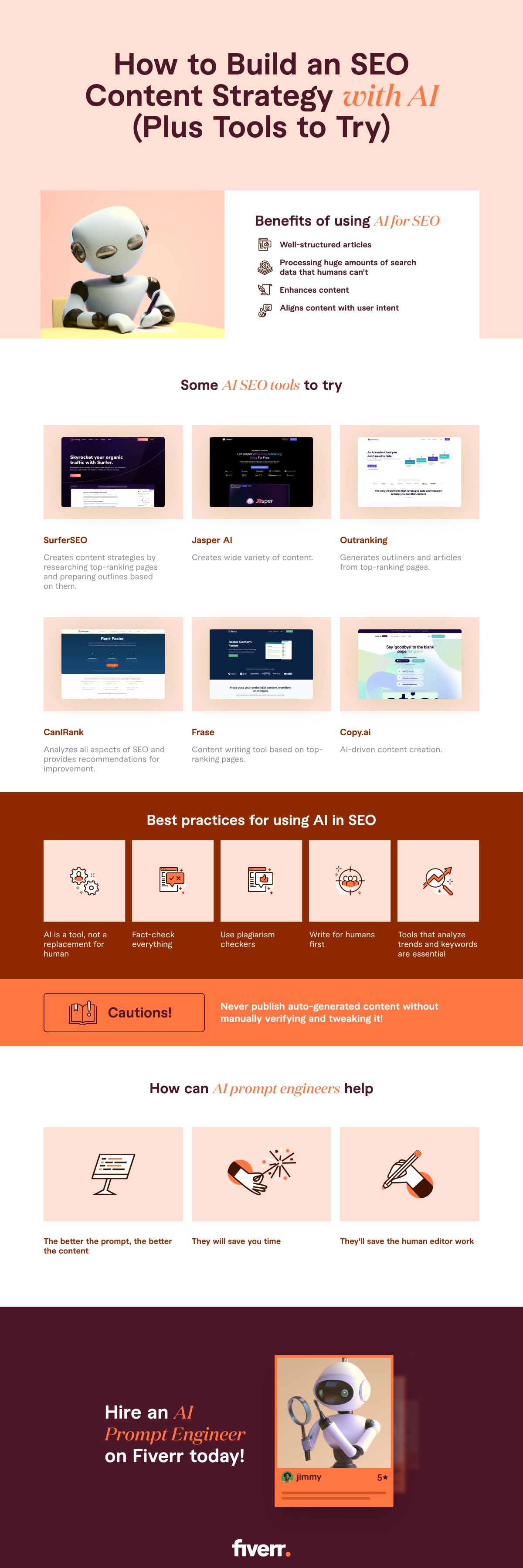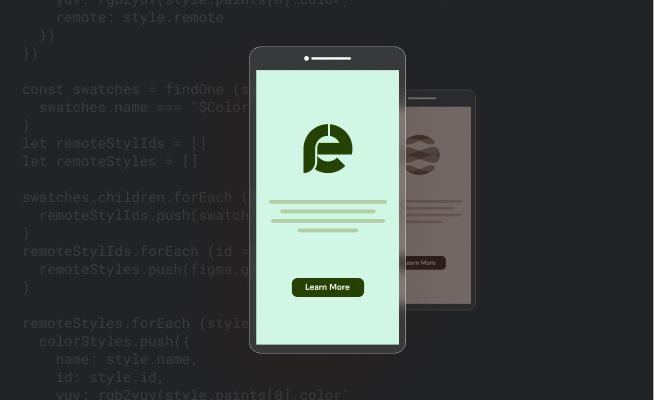Best AI tools to build your SEO content strategy
Let’s explore how you can use AI to build an SEO campaign, and the benefits and pitfalls of implementing such a strategy.
 September 21, 2023
September 21, 2023 20 minute reading
20 minute reading
SMBs have much smaller budgets to compete with the big players in search engine optimization (SEO). Lack of resources, funds, expertise, and time put SMBs at a disadvantage in creating a powerful SEO content strategy that works.
And when you finally get some time or resources to invest in a strategy that isn't "too bad," some huge company launches a massive multichannel campaign that sinks yours before it even gets started.
That's where AI tools come in. Using AI to build an SEO strategy can chop your time investment exponentially. Smaller businesses can now compete with the major players — provided they use it right.
AI isn't a silver bullet. It's a tool that, when used properly, can significantly improve your SEO efforts.
How exactly would that work?
Let’s explore how you can use AI to build an SEO campaign, and the benefits and pitfalls of implementing such a strategy.
What is AI and how can it help with SEO?
AI (artificial intelligence) is a branch of computer science that aims to mimic human intelligence in computers. AI often makes use of "Big Data" — enormous data sets — to analyze and draw conclusions at humanly impossible speeds.
In certain subcategories of AI, such as machine learning, machines are "taught" in a supervised and then unsupervised manner so their answers become more accurate the more they’re trained.
One example of how AI "learns" can be found in the Content Enhancement tool Grammarly. If enough users click on "Ignore suggestion," the AI tool learns to determine patterns from that particular context and will stop making similar suggestions in the future.
AI in SEO
SEO is a broad topic, and AI tools exist to improve each of the aspects of SEO. AI SEO tools are mostly geared toward SEO content creation.
One of the subcategories of AI is Natural Language Processing (NLP). The purpose of NLP is to understand the sentiment and overall intent of a piece of content.

Fiverr Seller Alan Redondo, who specializes in SEO and Search Engine Marketing, says, "AI tools do a pretty good job at taking a piece of content and optimizing it to ensure you're not including any grammar or spelling issues, and that you're making enough usage of the targeted keyword in the content. You can also ask AI to adjust the tone of the content to match the tone of the audience your content is intended for."
Connect with sellerSeveral tools allow you to modify or run an AI-driven analysis on your content's tone such as Grammarly, Jasper, and Outranking. That tone can be modified to be more friendly, formal, and so on.
How to use AI to improve your SEO strategy
SEO is a mathematical subject. In the early days, Keyword Density was a large ranking factor. So was Link Popularity. The more links pointing to your site, the better your site performed.
Unfortunately, this practice was abused by what the SEO industry calls "SEO Black Hats"—people who unethically manipulate search rankings by writing keyword-stuffed content, or by selling links in unethical link building practices.
Google continuously makes major changes to its ranking algorithm, and random inbound and internal links from everywhere on the internet have long ceased being important for your SEO ranking. At one stage, social media indicators also started to play a large role.
In all of the above, it comes down to mathematics: Google uses powerful computers to mathematically rank what it considers to be the best page to serve to users, based on hundreds of different ranking factors.
One of the most important factors: the quality of your site’s content.
Search engine algorithms are confidential. But AI SEO software providers, such as SurferSEO, have traditionally tried to figure out how those algorithms work and then develop their tools to emulate what they believe causes content to rank highly in search engine results pages (SERP).
How to build an SEO strategy with AI?
Before we jump into the necessary AI tools, let's look at the steps involved in creating an SEO strategy.

Keep reading to learn how to utilize the power of AI to improve your SEO content strategy and/or download our AI SEO content strategy infographic.
Download1. Keyword planning
Although full keyword planning is ultimately done by humans, AI-powered language processing can be leveraged to discover keyword clusters and put them into categories. They can also identify keyword difficulty, help you select your target keyword, identify search volume, and run a competitor analysis on a number of companies.
Unfortunately, too many companies are using the phrase "AI" broadly in their marketing, even if they only use a drop of AI. This makes it difficult to establish precisely which tools are using AI for this exact purpose. But our guess is that it's being leveraged in certain keyword research tools like SurferSEO and Google keyword planner at least.
Keyword planning is the base on which any successful SEO strategy counts so you might want to consider hiring a keyword research specialist to help you with this step.
2. Content planning
After mailing down the keywords and keyword clusters — groups of keywords focused around a central theme — you need to plan your content around those keywords.
This includes:
Listing the article topics
Generating outlines for each
SurferSEO and Jasper are popular tools that can do both. ChatGPT can also assist you in content planning for SEO by providing suggestions for article topics and outlines based on the keywords and keyword clusters you provide. You’ll find a more in-depth explanation in this guide.
3. Content writing
AI is touted as the solution to all content writing. From interviews conducted for Fiverr's series on AI, almost all SEO experts agree AI writing tools are best used with humans to create high-quality writing.
AI can streamline time-consuming tasks in content creation by:
Generating rough drafts
Coming up with meta descriptions
Creating content briefs
Writing explanatory paragraphs (for example, sections of articles that define core concepts)
Using the correct tone
AI tools for this include:
SurferSEO
Jasper
ChatGPT
Outranking
Pro tip: Be wary of any tool that claims to "create all your content in two minutes, ready to publish!" To avoid being penalized by Google, you need to create content that’s packed with value for your audience.
4. Content editing
This is another area where AI shines. AI editing tools exist that can help with various needs, such as:
Rewording
Changing the tone
Correcting grammar
A highly recommended tool is Grammarly. You to edit the content yourself, but its AI flags the areas to improve.
Wordtune rewords content for you. ChatGPT can also reword content in small batches.
No matter what AI tool you use, it's best to fact check your final text with the help of an AI Content Editor. This will prevent penalties for unhelpful content, and help your rankings in Google search.
5. Content publishing and repurposing
Now it's time to publish your content. But don't stop there—repurpose it into social media posts to increase awareness and engagement.
Lately.ai is a fantastic tool for this use case.
AI SEO tools to use for your strategy
Most AI SEO tools are AI content creation tools or AI writing assistants. They differ from non-SEO-focused tools, such as Lately.ai and Grammarly, because they cater to SEO-specific content needs. For instance, on-page SEO to boost your website rankings and drive more organic traffic to specific web pages or landing pages.
Let's take a look at several popular tools:
ChatGPT — The AI Swiss army knife
ChatGPT might seem like the be-all-and-end-all of AI tools, but it’s best used in combination with other tools.
Some examples of how this tool can be leveraged in SEO include:
Finding keyword clusters:

Categorizing keywords:

Creating detailed article outlines:

Ideation:


You can also use ChatGPT to change the tone of the way something is written. I don't love the output to this following prompt. I would rewrite the response because it comes across as slightly juvenile. That's why it's important to get an AI Content Editor involved to polish up AI generated content:

I also created a full content SEO plan with the query: "Create a table for a content SEO plan for a new hardware store in Brooklyn"
You can also use ChatGPT to change the tone of your content. You can rewrite the response if it doesn’t his the mark. Or hire an AI Content Editor to polish the AI generated content:
We also created a full content SEO plan with the query: "Create a table for a content SEO plan for a new hardware store in Brooklyn."
Custom AI tools
The popularity of ChatGPT sprung forth new custom AI applications using OpenAI's API. The API allows you to integrate ChatGPT and Dall-E 2 functionality directly into your own application.
Some examples of custom SEO AI applications being created with the ChatGPT API include:
Tools to automatically create WordPress blogs using ChatGPT
White-labeled writing tools
Ideation tools
Basically, anything ChatGPT can do, can be brought into your own business application, provided you have an AI developer to do it.

Hire AI experts on Fiverr to build and integrate AI Engines into your application or website.
AI AwaySurferSEO
SurferSEO has been around for a while and provides extensive insight into SEO content creation.
Particularly useful is its free SEO outline generator.
We typed "The Best Flowers for Valentine's Day" into the tool and Surfer SEO generated an impressive outline.

After configuring the keywords and outline for your article in the paid version of SurferSEO, start writing in its integrated editor. The editor shows keywords to use, number of headings to add, and number of images and paragraphs to improve SEO optimization.
As you type, the content score needle moves.
We've used this AI content writer tool extensively and it's a bit of a creative challenge to write this way. The writing also suffers and tends to read like it’s written "for robots." Not good for Google.
So we recommend the following:
Using this content editor as a guide rather than a rule
Writing your content in a different editor first, then tweaking it here, and adding keywords where it makes sense to increase the content score.
Taking a final pass on the copywriting and ensuring the language is relevant to the search intent and target audience
SurferSEO's pricing starts at $59/mo and goes up to $239/mo. There are discounts for annual packages. The basic package lets you create 10 articles a month, and the business package lets you create 70.

Jasper AI
Jasper AI is a GPT-3 content generation tool with many templates for generating content.
GPT stands for "Generative Pre-trained Transformer," which is an AI language model using past data to predict future data. In GPT-3's case, the past data is from the internet (so far it only knows what’s been published on the web up to 2021). GPT-3 is the third generation of this model.
Jasper also offers a "Jasper Chat" version which works in the conversational style that’s made ChatGPT so popular.

When you sign up for Jasper AI, it immediately leverages its AI prowess. It asks for your website domain to learn about the type of content you're currently writing.

We used the "One-Shot Blog Post" template to see how this tool might help. The tool asked for a title and tone and then generated an article.

The final article was only 378 words. SEO content typically needs to be much longer. The article was also very general, so it would be good to hire a professional blog writer to bring this prose to life.

The tool also provides something called "Jasper Recipes." These are workflows made up of predetermined commands to help you automate repetitive tasks.

Jasper's pricing starts at $49 per month for 50,000 words, and goes up to $500 per month for 700,000 words. There’s also a free trial.
Outranking
Outranking leverages AI to create SEO content, and tries to do most of the content creation.
There’s no free trial, but users with one domain can test it for the first month at a $7 price tag. After that, the "Solo" plan costs $79/mo. You can only create ten articles monthly with the Solo plan, but this should be more than enough for small businesses working on their own websites.
The Pro plan costs $149/mo and lets you write 20 articles. The Company plan costs $219/mo and gives you 30 articles. All plans include unlimited AI usage.

Outranking's "Assisted Workflow" uses AI to generate titles and outlines, and then content using AI algorithms and data. You feed a keyword to the tool, and it gives you five unique SEO titles based on the real-time metrics its AI processed.
We used "Tulips" as a topic because it's something I know nothing about.

After typing in the word, Outranking's AI magic started to crunch data from the top-ranking pages on the internet for this keyword.
From this data, the AI works out several titles to choose from. Honestly, there wasn't much variety in the titles, and this is where all AI tools fall short — they can only write based on work that already exists; they have no originality.
We need humans for that.
That's why using these tools in combination with human creators or AI prompt writers is the best way to leverage the technology.
But the titles weren't bad, and each can be edited into an awesome SEO article.

By clicking Continue, the tool started writing the entire article.
Now, this is where you should take a breath and pause. Before copying this and publishing it on the internet, it needs a quality check.

Outranking automatically generated content for the keyword "Tulips"
With the naked eye, we can see the first paragraph was subpar. The first paragraph lacked life and was difficult to read.
But it provided an excellent starting point. We can work with that first paragraph and turn it into something more compelling.
And, to be fair, we didn't give the tool much to go on with our solitary "Tulips" keyword. In AI, the quality of the prompt has a lot to do with the quality of the output. Hiring an AI prompt engineer who knows what they’re doing, saves you time in the long run.
We took it a step further and ran all the content through Grammarly's plagiarism checker. The result was...ouch! The content bombed with a shocking 22% plagiarized score!

Okay, before we condemn this tool completely, there are a few important points to consider:
No AI tool today can write long-form content excellently. Outranking tries to go too far by creating everything. An outline and a few bullet points would be enough for a writer to fact-check and turn into awesome content.
No AI tool can create original content. They all derive content from other sources. Now, that's okay, so long as you credit your sources. Journalists do this all the time. None of these tools seem to provide a link to where data is from. In either case, a human should always rework your AI-generated content.
Finally, we gave it too little input. A single keyword—Tulips— says nothing about the intent of our content.
CanIRank
CanIRank is a powerful AI SEO tool that has little to do with automated content creation. However, we recommend it because it uses AI to provide a variety of insights into your website's overall performance. It then gives multiple data-driven suggestions to improve several aspects of your website's SEO.
We typed in a website and the keyword we’re trying to rank for, and CanIRank's AI got to work immediately:

At the end, CanIRank provided an extensive set of factors that needed attention to help the page rank better:

CanIRank is a must-have in your collection of AI content marketing tools because it looks at all aspects of SEO, including backlinks and competitor pages.
The tool has a free tier with limited functionality. Its DIY individual package costs $49/mo. The DIY Agency package is $299/mo and analyzes up to 25 websites.
If you feel overwhelmed by all the tools, consider hiring an SEO Strategist to help you choose the best for your strategy.
Other tools
There are other SEO AI tools available for small businesses, some better than others. Use those you’re most comfortable with and that match your budget.
Some of the other popular tools for creating SEO content strategies include:
MarketMuse: Analyzes website content and provides SEO analysis based on the results
Frase.io: AI-driven content creation
BrightEdge: Measures performance and suggests optimized content based on AI insights
Common challenges when implementing AI for SEO
AI SEO tools work off the hypothesis of understanding actual SEO algorithms. But no one outside of Google, Bing, or other search engines knows what those algorithms are. As good as the AI in SEO tool is, it's using a model not used in Google's algorithm.
"It's important to cross-check data output from AI tools with other SEO tools, such as Ahrefs and Semrush," says Redondo.
By cross-checking AI tool output with other SEO tools, you increase your chances of producing content that might rank well.
"I still need to use keyword planning tools to get hard data about keywords to use," says Jasmine Powers, CEO of Jasmine Powers Multimedia, a marketing and revenue operations company in New Orleans. "AI also won't help with technical implementation or outreach, although it could tell you how to do that, and compose scripts to support outreach efforts for backlinks."
Based on extensive interviews conducted, the general sentiment is AI is helpful to humans, but not a replacement. AI remove tedious tasks such as keyword researching, outlining, title generation, and so on.
So, the traditional tools aren’t going away. AI will simply complement them.
The human touch is a must
Another problem: some believe AI can write all the content and without touching it up. In reality, AI-generated content sometimes needs to be completely rewritten.
Google recently released its "Helpful Content" algorithm, which prioritizes content that’s helpful to users.
Recently, the question was asked: "Does Google hate AI-generated content?" And Google answered in a public Twitter thread. The response is it doesn't penalize any content created primarily to help users.
Small businesses tend to have strapped budgets. Unscrupulous AI providers might promote their tool specifically as an AI generator for small businesses, stating how "no work is needed to publish content." This is a major red flag, and could cost your small business a lot more than you save using said tool.
Always check your AI-generated content and ensure it helps users.
Scott Liebermann, the founder of TouchdownMoney, a personal finance website, also recommends hiring writers to augment the solutions provided by AI.
"Allow them to use AI tools to speed up content creation,” says Liebermann. “But be sure not to publish anything that doesn't add more value than what a bot can create on its own. If you're punching out the same stuff anyone else can, Google has no reason to list your article ahead of what's already out there."
Baruch Labunski, CEO of Rank Secure, an SEO agency based in Toronto, says, "I’d keep human editors even with AI because you still need them to tidy up the AI-produced content, and you still want to mix in totally original content to maintain your solid ranking. Those who use AI tools still need humans to make sure best practices are used for high-quality content."
One possible formula for the optimum use of SEO AI tools is:
Choose the right AI tool
Create the right AI prompt
Leverage human creators and editors to turn that content into powerful prose that ranks well in search engines.
The future of AI and SEO
The most effective AI strategies will be cooperative: AI plus humans working together. Highly original work—the cream of the crop for SEO—can only be produced by humans.
But AI can be used for research and as an optimization tool to speed up writing processes and improve the end user experience. Plus, it can tweak original content for readability and keyword optimization. Lastly, it can assist you in coming up with content ideas.
Coupling an AI writer with an experienced SEO writer is worth its weight in gold.
"Human editors will need to infuse brand voice," says Powers, "and check for accuracy to ensure the quality of what’s being composed. SEO has a trust factor, so it's important for someone to make sure output stands up to editorial policies and garners audience trust."
Hiring AI prompt writers is the best way to create AI-generated content without spending months or years learning it yourself.
AI is the future, and brands that leverage it now will reap the benefits today.
Fiverr is a professional marketplace of freelancers with many experts in AI tools. Join the Fiverr marketplace today to find AI SEO experts to assist with your SEO strategy.



